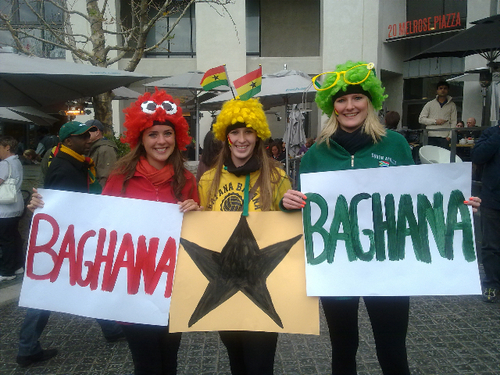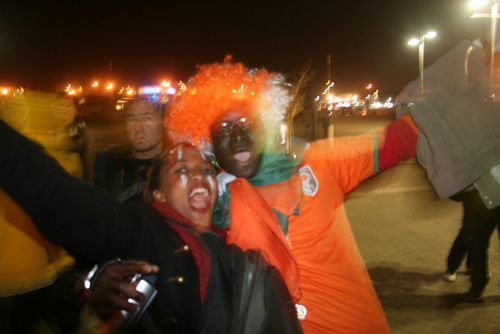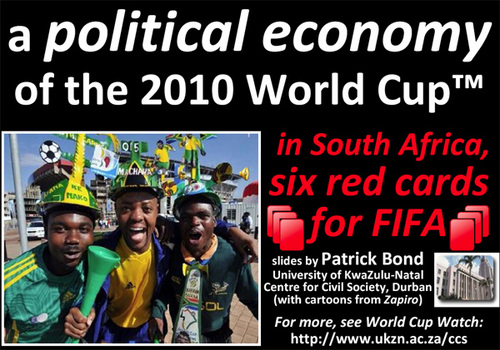In the run-up to the World Cup, countless advertisements from around the globe began to build the hype for the 2010 tournament in South Africa. The vast majority of these ads – including some mentioned elsewhere in this dossier – … Continue reading “Critiquing What We Love”
Category:
The Pan-African Journey
mark sawyer“…I can see that you are here in the millions and my last warning to you is that you are to stand firm behind us so that we can prove to the world that when the African is given a … Continue reading “The Pan-African Journey”
The Tragedy and Farce of French Football Politics
paul silversteinThere is something utterly farcical about the social drama that accompanied the French national soccer team’s decided under-performance at the World Cup in South Africa — what American soccer journalists comically dubbed le meltdown and French media, the “fiasco” … Continue reading “The Tragedy and Farce of French Football Politics”
A World Cup of a 'Special Type'
karam singhThere have been numerous milestones in South Africa’s journey from a pariah state characterized by the most brutal form of settler colonialism and white supremacy to a young democracy struggling to find its rightful place in a the post … Continue reading “A World Cup of a 'Special Type'”
Starry Eyed Black 'Bama
imani perryLet me begin with this: I am a Bama: literally, from Alabama. Before I am an intellectual, a diasporic subject, a celebrator of transatlantic blacknesses who carefully sidesteps essentialism and embraces all of humanity, I am a Bama. Granted, these … Continue reading “Starry Eyed Black 'Bama”
Vuvuzela: A Loud, Blank Cipher
andrew rossLocals who had hoped that the rest of the world would take away some useful knowledge about South Africa’s current affairs could hardly be faulted for cursing the existence of the vuvuzela. Zealous opinion about the ubiquitous plastic horns … Continue reading “Vuvuzela: A Loud, Blank Cipher”
Listening to the World Cup
jennifer doyleWith ESPN’s broadcast of the World Cup’s opening match, my fellow tweeters began to crack jokes about The Lion King. We imagined Rafiki calling the matches, or Mufasa, and half expected the referees to lift up the Jabulani to announce … Continue reading “Listening to the World Cup”
World Cup Soccer: Enjoyment and Identification
Eli Jelly-SchapiroFootball fans can be divided, somewhat crudely, into two categories: those attracted to the game for aesthetic gratification, and those whose fandom is rather driven by feelings of group solidarity. These categories are not mutually exclusive. A beautiful move acquires … Continue reading “World Cup Soccer: Enjoyment and Identification”
Africa's World Cup?
sean jacobsOn the eve of Ghana’s fateful loss to Uruguay in the quarterfinals, South Africa’s ruling party, the African National Congress, declared them the Black Stars of Africa. Locals joined their compatriots across the continent in willing the Black Stars on. … Continue reading “Africa's World Cup?”
Performing the Future
Social Text CollectiveSocial Text collective member José Muñoz will be among the presenters at this state of the field conference on performance, to be held July 8th – 10th, 2010, at the House of World Cultures in Berlin. Click here for the full conference program.
World Cup Soccer: Enjoyment and Identification
Eli Jelly-SchapiroFootball fans can be divided, somewhat crudely, into two categories: those attracted to the game for aesthetic gratification; and those whose fandom is rather driven by feelings of group solidarity. These categories are not mutually exclusive. A beautiful move acquires even greater beauty when performed by a player or team with whom one identifies; feelings of solidarity are emboldened when joined to rare artistry.
A Political Economy of the World Cup in South Africa, 6 Red Cards for FIFA
patrick bondClick here to download a .pdf of Patrick Bond’s presentation.
On the Subject of Citizenship
Micki McGeeJust in time for the Independence Day weekend, the Library of Congress has released new research on the Declaration of Independence. Apparently when Thomas Jefferson was drafting the document he initially used the word “subjects,” then blotted it out and replaced it with the word “citizens.” Library of Congress preservation researcher Dr. Fenella France has used spectral photographic imagery to uncover the original markings. In the popular press, Jefferson’s writing is described as a “Freudian slip” …
New dossier on Cruising Utopia
Social Text CollectiveAs we exit a more contentious than usual month of Gay Pride, Social Text brings you this dossier of critical appreciations of long-standing collective member José Esteban Muñoz’s new book, Cruising Utopia: The Then and There of Queer Futurity. Read responses from Lauren Berlant, Barbara Browning, Gayatri Gopinath, and Ricardo Ortiz. Muñoz responds to his responses, and performance art legend Vaginal Davis contributes an original illustration inspired by Cruising Utopia.
The Utopian in the Everyday
gayatri gopinathAs I sat down to write these comments, I found myself thinking of another time and place, over ten years ago, when I initially encountered José Muñoz’s first book Disidentifications: Queers of Color and the Performance of Politics. Upon … Continue reading “The Utopian in the Everyday”













